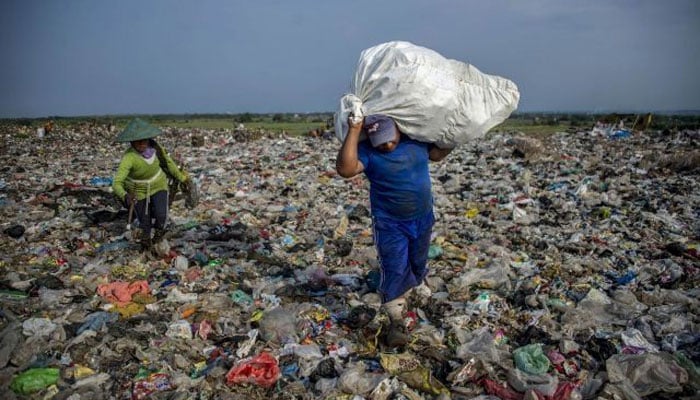UN aims to reduce plastic pollution by 80% by 2040
Plastic production, including single-use plastics, surged to 139 million metric tons in 2021 of waste, which could triple by 2060
A recent report from the United Nations Environment Programme suggests that countries have the potential to decrease plastic pollution by 80% within the next two decades. Plastic pollution poses a global problem, impacting various environments, including the Arctic, oceans, and even the air we breathe.
The severity of the issue becomes evident with the discovery of rocks made of plastic on a remote Brazilian island and the formation of plastic-filled patches in the Pacific Ocean, supporting coastal creatures far from their natural habitats.
Plastic production has witnessed a significant surge in recent decades, particularly in single-use plastics, while waste management systems have failed to keep pace. In 2021 alone, a staggering 139 million metric tons of single-use plastic waste was generated worldwide. Unless action is taken, global plastic production is projected to triple by 2060.
To address this crisis, the report provides governments and businesses with a roadmap to substantially reduce plastic pollution, focusing on three key strategies: reuse, recycling, and alternative materials. The report emphasizes the significant impact of reusing plastics and recommends promoting refillable bottles, deposit schemes to incentivize the return of plastic products and take-back programs for packaging. This approach is deemed the most effective, potentially reducing plastic pollution by 30% by 2040.
Scaling up recycling efforts could further contribute to a 20% reduction in plastic pollution, considering that only 9% of plastics are currently recycled globally, with the remainder ending up in landfills or incinerated.
The report also advises discontinuing fossil fuel subsidies that make new plastic products cheaper, thereby discouraging recycling and the use of alternative materials. Fossil fuels serve as the raw ingredient for almost all plastics.
The use of suitable alternative materials for single-use products, such as wrappers and sachets, including a shift towards compostable materials that easily break down, could reduce plastic pollution by 17%, according to the report.
Inger Andersen, the Executive Director of UNEP, highlights the adverse effects of plastic on ecosystems, human health, and climate stability. The report advocates for a circular approach that prevents the entry of plastics into ecosystems and our bodies while fostering economic viability.
Implementing the recommended changes would require an estimated annual investment of around $65 billion. However, the report argues that the costs of inaction far exceed this amount. A transition to an economy that prioritizes plastic reuse and recycling could result in savings of $3.25 trillion by 2040, by mitigating the negative impacts of plastic on climate, health, air quality, and water resources.
By reducing plastics by 80%, the report estimates an annual reduction of 0.5 billion tons of carbon pollution, thereby contributing to climate change mitigation. Furthermore, this transformation has the potential to create approximately 700,000 new jobs, primarily in developing countries.
Nevertheless, despite these transformative measures, the world is projected to manage approximately 100 million metric tons of plastic waste from short-lived products by 2040. Addressing this challenge will necessitate stricter standards for non-recyclable waste and increased accountability of manufacturers for the consequences of their plastic products.
The release of this report coincides with forthcoming negotiations in Paris, where countries aim to establish an international treaty on plastics, encompassing the entire life cycle of plastics. However, the inclusion of restrictions on plastic manufacturing remains a contentious issue that is yet to be resolved.
-
Japan Elections: Stock surges record high as PM Sanae Takaichi secures historic victory
-
$44B sent by mistake: South Korea demands tougher crypto regulations
-
South Korea: Two killed as military helicopter crashes during training
-
Jake Paul criticizes Bad Bunny's Super Bowl LX Halftime Show: 'Fake American'
-
Hong Kong court sentences media tycoon Jimmy Lai to 20-years: Full list of charges explained
-
Trump passes verdict on Bad Bunny’s Super Bowl halftime show
-
Blac Chyna reveals her new approach to love, healing after recent heartbreak
-
Melissa Jon Hart explains rare reason behind not revisting old roles












